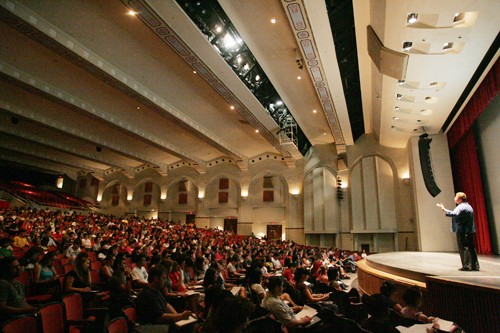Students who want to put off registering for those pesky required classes might want to reconsider in the future. Growing waiting lists have left some students scrambling to enroll in a variety of courses.
This year the College of Science, for example, is offering 25 percent more seats to accommodate an influx of students in three of its larger classes, chemistry 151, biology 181 and physics 102. However, traditions and cultures classes and others have had to deal with extensive waiting lists.
Budget pressures have forced administrators to cut the number of offered classes, said Jim Shockey, associate dean of the College of Social and Behavioral Sciences.
Anthropology and geosciences professor Vance Holliday teaches a traditions and cultures 101 class called Patterns in Prehistory. The waitlists, he said, were a major source of confusion at the beginning of the semester.
“”It’s a mess, we had to add 25 new students at the last minute,”” he said. “”The issue comes down to having TAs teaching discussion sessions to students who missed the first week of class.””
Traditions and cultures classes have been among those with the longest waiting lists on campus, Shockey said.
Holliday said that having teaching assistants lead discussion sections does not bring down the quality of the class, but added that students who missed the first three class meetings will be hard pressed to catch up.
“”I don’t know how we are going to handle it,”” he said. “”This isn’t an efficient way to run a university.””
Bryan Sturdivant, a pre-physiology sophomore, who joined Holliday’s class on Monday, said he was relieved at being able to add the class.
“”I’ve been on the waiting list since day one,”” he said. “”This is the last TRAD class I have to take and there were no openings in any other TRAD 101s. I feel really fortunate I don’t have to take it next semester.””
Other students were not so lucky.
Samantha Megerle, a pre-nursing sophomore, was unable to switch into the section of Patterns in Prehistory she needed to fill her schedule. The issue, she said, is that because there are no available spots in the class she needs, her only option is to find someone to switch with. So far, she said, she has been unsuccessful.
Statistics about waiting lists are difficult to compile because there is no central database for this data, said Aeyn Edwards at the Office of Institutional Research and Planning Support. Instead, statisticians would need to ask each professor for the number of waitlisted students in their classes, which could take weeks, he said.
Shockey said he understands the concerns of students who are having a difficult time getting into certain tradition and cultural classes.
He said that although large waiting lists have become more of a problem in recent years, administrators have been doing everything they can, including adding emergency sections, to address the problem.
Emergency sections were added to, among others, Holliday’s Patterns in Prehistory class and philosophy 101- Logic and Critical Thinking, where 21 students were on the waiting list, Shockey said.
He added that his biggest priority is to maintain the level of academic excellence.
“”New sections like the Centennial Hall classes allow students to take classes from the department’s best professors,”” he said.
While other colleges have had fewer problems with waiting lists than social and behavioral sciences, additional class sections are becoming commonplace throughout the university, said Elliot Cheu, associate dean of the College of Science.
“”Waiting lists have primarily been an issue in the lower level classes due to a large increase in freshman,”” he said. “”We try to judge students’ needs for adding specific classes on a case-by-case basis, therefore upperclassmen and those who need the class to graduate are a priority.””
There are certain majors, such as journalism, that can’t add additional students to classes due to national requirements placed on the major, Shockey said.
“”Adding students to those classes isn’t an option,”” he said. There is no guaranteed way to make sure students get into particular classes, he said, but there are certain precautions that any student can take.
“”If students are finding themselves concerned about getting into a class next semester,”” he said, “”my best advice is to plan ahead, don’t procrastinate, and talk to your adviser.””









